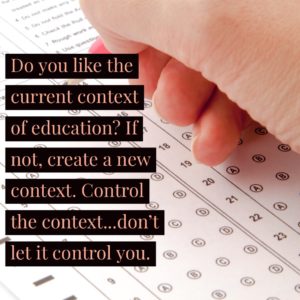It’s been a few weeks of immersion in thinking and conversation around learner-centered education and the corresponding paradigm shift having recently attended Pioneer Lab Training and Big Picture Learning’s Big Bang Conference. Here are some of the questions that have surfaced for me:
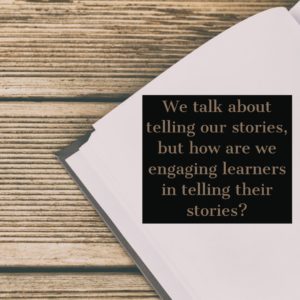 We talk about telling our stories, but how are we engaging learners in telling their stories? This is an area we need to grow in and probably one of the carry-overs from a school-centered paradigm – this idea that the adults have to own telling the story, the story of the work to transform learning environments. But it’s not about the adults being the mouthpiece. Learners can tell the story much more powerfully, as I experienced many times these past two weeks. What are the most effective ways for us adults to engage young learners in telling their own story? Storytelling that can more effectively enroll others into the learner-centered paradigm.
We talk about telling our stories, but how are we engaging learners in telling their stories? This is an area we need to grow in and probably one of the carry-overs from a school-centered paradigm – this idea that the adults have to own telling the story, the story of the work to transform learning environments. But it’s not about the adults being the mouthpiece. Learners can tell the story much more powerfully, as I experienced many times these past two weeks. What are the most effective ways for us adults to engage young learners in telling their own story? Storytelling that can more effectively enroll others into the learner-centered paradigm.
Do you like the current context of education? If not, create a new context. Control the context…don’t let it control you. This question ultimately gets at agency and leadership. The school-centered paradigm has so many components that frustrate a wide array of stakeholders. Rather than complain about the shortcomings of the school-centered paradigm, it’s time to create a new context – one where learning happens in the learner and not to the learner; one where we leverage learners’ interests and passions; one where every learner is unique, capable, curious and with unlimited potential; one where we are unconstrained by how we learn, what we learn, where we learn, when we learn and with whom we learn. The paradigm shift is creating the new context.
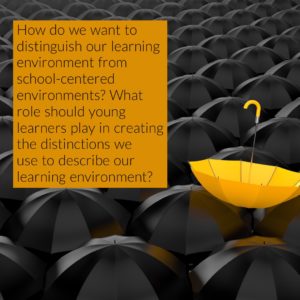 How do we want to distinguish our learning environment from school-centered environments? What role should young learners play in creating the distinctions we use to describe our learning environment? This question is somewhat of a combination of the previous two questions. Who needs to be at the table when we are distinguishing our learning environment from the traditional school-centered environment? If we don’t have a wide variety of stakeholders, especially young learners, then we are just modeling the traditional school-centered system. Leading a learner-centered environment requires leadership that is learner-centered. (You can listen and read what we are learning about learner-centered leadership on the Shift Your Paradigm podcast. Be sure to listen to the podcasts and read the reflective blog posts.) How do we have intentional conversations with stakeholders about the distinctions? And how do those distinctions evolve over time, providing space for new models to emerge?
How do we want to distinguish our learning environment from school-centered environments? What role should young learners play in creating the distinctions we use to describe our learning environment? This question is somewhat of a combination of the previous two questions. Who needs to be at the table when we are distinguishing our learning environment from the traditional school-centered environment? If we don’t have a wide variety of stakeholders, especially young learners, then we are just modeling the traditional school-centered system. Leading a learner-centered environment requires leadership that is learner-centered. (You can listen and read what we are learning about learner-centered leadership on the Shift Your Paradigm podcast. Be sure to listen to the podcasts and read the reflective blog posts.) How do we have intentional conversations with stakeholders about the distinctions? And how do those distinctions evolve over time, providing space for new models to emerge?
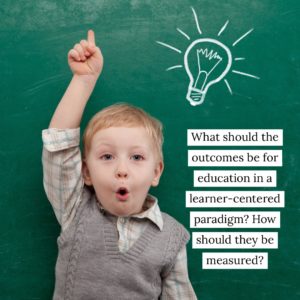 What should the outcomes be for education in a learner-centered paradigm? How should they be measured? Several years ago, our stakeholders develop a Profile of a Graduate and adopted a corresponding set of beliefs about powerful learning. While this is a start, our next step is to provide more focus and direction to what these outcomes should look like at the various grade spans. What does proficiency in curiosity look like in an elementary learner as opposed to a high school learner? Who gets to generate the outcomes? How are learners involved? And what does proficiency look like at each level? As we develop this work, we have to be careful not to fall into the school-centered paradigm. Outcomes and measurements have to look different from outcomes and measurements in the school-centered paradigm.
What should the outcomes be for education in a learner-centered paradigm? How should they be measured? Several years ago, our stakeholders develop a Profile of a Graduate and adopted a corresponding set of beliefs about powerful learning. While this is a start, our next step is to provide more focus and direction to what these outcomes should look like at the various grade spans. What does proficiency in curiosity look like in an elementary learner as opposed to a high school learner? Who gets to generate the outcomes? How are learners involved? And what does proficiency look like at each level? As we develop this work, we have to be careful not to fall into the school-centered paradigm. Outcomes and measurements have to look different from outcomes and measurements in the school-centered paradigm.
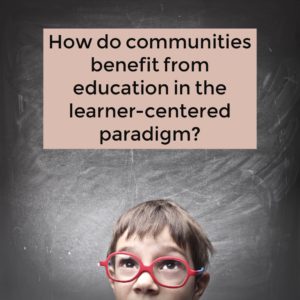 How do communities benefit from education in the learner-centered paradigm? Again, the diversity of the community should be involved in generating meaning around this question, including young learners. The answers here can be tied to the WHY of transformation. Yes…young learners will reap most of the benefits of the transformation when the focus is on the learner, their needs, passions and interests. But as I heard this past week, something to the effect of, “Happy and healthy learner; happy and healthy community.” If all learners are prepared for success in whatever 21st century life brings their way, then our communities will benefit from that success. But what specifically are those benefits? Are they unique to certain stakeholders? Something our community needs to ponder.
How do communities benefit from education in the learner-centered paradigm? Again, the diversity of the community should be involved in generating meaning around this question, including young learners. The answers here can be tied to the WHY of transformation. Yes…young learners will reap most of the benefits of the transformation when the focus is on the learner, their needs, passions and interests. But as I heard this past week, something to the effect of, “Happy and healthy learner; happy and healthy community.” If all learners are prepared for success in whatever 21st century life brings their way, then our communities will benefit from that success. But what specifically are those benefits? Are they unique to certain stakeholders? Something our community needs to ponder.
What are your questions around the learner-centered paradigm? Do these resonate? What others would you add?
Connect with Randy on Twitter, the TLTalkRadio podcast, and the Shift Your Paradigm podcast!
Get new content delivered to your inbox and the ebook 3 Key Principles of Digital Transformation. The ebook contains valuable information from my experience leading a digital transformation and working with a variety of stakeholders over the past decade.
- A silver lining - January 22, 2022
- Is our use of tech working against us? 🤔 - September 8, 2021
- What’s NOT going to change in the next 10 years? 🤔 - September 7, 2021
